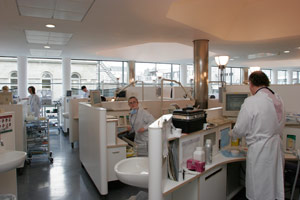Clinical Mission:
To continue the provision of high quality primary, secondary and tertiary dental care for appropriate patients through optimal use of available resources whilst improving the patient journey.
Dental Services
The following services are provided by the Dublin Dental University Hospital:
1. Primary Care is provided by undergraduate dental students working in the hospital, dental auxiliaries in outreach settings and by Non-Consultant Hospital Dentists in prisons in the Dublin area.
Acceptance Criteria
 Suitable for undergraduate dental students: routine restorative treatment under local anaesthetic. The agreed treatment plan must be capable of being completed in one academic year. Patient must be able to attend on student schedule and commit to any costs involved. The waiting lists are stratified by undergraduate dental year.
Suitable for undergraduate dental students: routine restorative treatment under local anaesthetic. The agreed treatment plan must be capable of being completed in one academic year. Patient must be able to attend on student schedule and commit to any costs involved. The waiting lists are stratified by undergraduate dental year.- Patients unsuitable for undergraduate dental students include: treatments that are too complex, too extensive, or patient management is beyond the scope of undergraduate dental clinics.
- The Dublin Dental University Hospital does NOT provide any dental assessments prior to medical or surgical treatments. These include but are not limited to, bisphosphonate therapy, cardiac procedures, orthopaedic surgeries, chemotherapy or similar interventions.
Referrals to Restorative Dentistry and Periodontology, Endodontics and Oral Surgery should be made directly to each area and marked suitable for undergraduate dental care.
Please utilise the following proforma letters:
Please complete the proforma referral letters and send via email to:
patient@dental.tcd.ie
or by post to
Dublin Dental University Hospital, Lincoln Place, D02 F859.
Please utilise the following proforma letters:
- Restorative Dentistry Periodontology and Endodontic Proforma letter
- Oral Surgery Proforma letter
- Oral Medicine Proforma letter
In making a referral it is important to include mobile phone numbers as the Hospital uses text messaging for patient appointment reminders
All Paediatric Dentistry waiting lists closed until further notice.
- Paediatric Dentistry: Children age 5-12 years with the expectation of good behaviour may be accepted for treatment by undergraduate students according to specific criteria.
- Secondary and tertiary specialist services are provided within the Dental Hospital for educational purposes and in relation to special populations such as children with developmental defects of the dentition. General anaesthesia is not available on site.
- Paediatric Dentistry Proforma letter
In making a referral it is important to include mobile phone numbers as the Hospital uses text messaging for patient appointment reminders.
2. Secondary Care clinics provide diagnosis, advice and treatment in the following:
Further information on each clinic can be found in this section under CLINICS
| Oral dysplasia | Joint Complex Oral Medicine | Maxillo-facial Surgery and Prosthodontics (Head and neck cancer rehabilitation) | Joint Orthodontic Restorative |
| Facial Deformity Surgery (Orthognathics) | Paediatric Dentistry | Forensic Dentistry | Sleep Apnoea |
| Oncology and Restorative Dentistry | Restorative and Periodontology joint Implantology | Joint Restorative Oral Surgery with Sedation | Interdisciplinary Dental Trauma |
| Transplant and Medically compromised | Paediatric OMFS | Liver and renal transplant patients |
Notes
- Patient referrals to Maxillofacial Surgery and Oral Surgery follow the same pathway.
- Patient referrals to Implantology can be through Prosthodontics, Oral and Maxillofacial Surgery or Periodontology.
- Patient referrals for Type 1 latex allergy patients are via the Special Care Clinic.
- Patient referrals for medico-legal clinics are made by direct referral to the Medico-legal Department at the Dublin Dental University Hospital.
- The referral letter for Oral and Maxillofacial Surgery can be downloaded here.
- Instructions for clinicians wishing to send a biopsy specimen the Oral and maxillofacial Pathology Unit is St James’ Hospital can be found here
Notes
Forensic Dental requests are accepted only from Coroners and State Pathologist Offices and an Garda Síochána.
Patient referrals to Joint Restorative Oral Surgery with Sedation are via the Special Care pathway.
Patient referrals to Interdisciplinary Dental Trauma are made through the Paediatric Dentistry or Endodontic pathways.
Patient referrals for Paediatric OMFS are via the Oral Surgery pathway.
Patient referrals to Transplant and Medically compromised, liver and renal transplant patients are via the Special Care referrals pathway.

